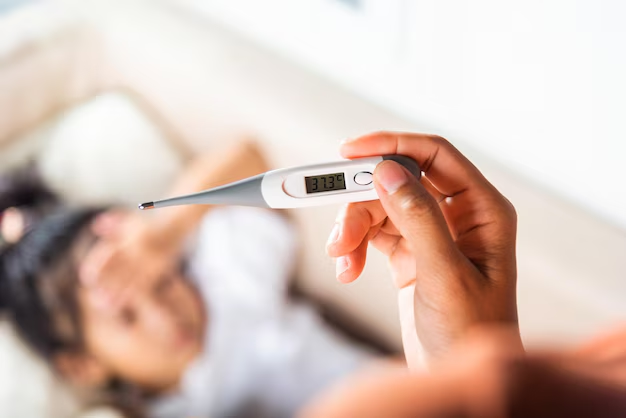Understanding Fever and Pneumonia: What You Need to Know
Pneumonia is a word that often raises alarm, given its reputation as a serious lung infection. Many questions arise when you suspect someone might have pneumonia, and one common query is, Do you always have a fever if you have pneumonia? Let’s unpack this and explore various facets of pneumonia, symptoms, and how to identify it, ensuring you have the right information at your fingertips.
What is Pneumonia?
Pneumonia is an infection that inflames the air sacs in one or both lungs, which can fill with fluid or pus, leading to symptoms like a cough, fever, chills, and difficulty breathing. It is often caused by viruses, bacteria, or fungi.
Causes of Pneumonia
- Bacterial Pneumonia: Often triggered by the bacterium Streptococcus pneumoniae.
- Viral Pneumonia: More prevalent, usually less severe, and often accompanied by other infections like the flu.
- Fungal Pneumonia: More common in individuals with weakened immune systems.
- Aspiration Pneumonia: Occurs when food, drink, vomit, or saliva is inhaled into the lungs.
Role of Fever in Pneumonia
A fever is a common symptom when your body fights off infections. This naturally leads to the assumption that a fever is an essential marker of pneumonia. However, while a fever is a usual sign, its presence isn't always guaranteed.
Factors Affecting Presence of Fever
- Age: Older adults may develop pneumonia without a distinct fever.
- Immune System: Individuals with weakened immune systems, such as those suffering from chronic illnesses, may not exhibit standard symptoms.
- Type of Infection: The type of pathogen causing pneumonia can also alter the symptom profile, including the presence of a fever.
Other Common Symptoms of Pneumonia
While fever is often associated with pneumonia, it's important to consider other common symptoms:
- Cough: Often productive, meaning it brings up phlegm or pus.
- Shortness of Breath: Difficulty in breathing, which may worsen over time.
- Chest Pain: Usually a sharp or stabbing pain that worsens with deep breaths.
- Fatigue: Persistent tiredness despite adequate rest.
- Chills and Sweating: Often accompany fever as the body fights the infection.
- Confusion: Particularly in older adults, marked by disorientation or difficulty focusing.
Less Common Symptoms
Though less frequently observed, symptoms like headaches, muscle pain, or a sore throat might occur depending on the infection's type and severity.
Diagnosing Pneumonia
It's crucial to accurately diagnose pneumonia via clinical evaluation and sometimes imaging tests. Here are the common diagnostic procedures:
Clinical Evaluation
Doctors typically start with a physical examination, listening to your lungs with a stethoscope for abnormal sounds like crackling or bubbling. The patient's medical history and symptom descriptions are also vital in forming an initial assessment.
Imaging and Tests
- Chest X-ray: Helps confirm pneumonia and determine the extent and location of the infection.
- Blood Tests: Check for indicators of infection and help identify the cause.
- Sputum Culture: Analyzes the specific bacteria or organism responsible.
- Pulse Oximetry: Measures the oxygen level in your blood to assess the severity of pneumonia.
Preventive Measures Against Pneumonia
Prevention is always better than cure. Here are steps you can take to lower your chances of contracting pneumonia or reducing its severity:
- Vaccinations: There are vaccines for pneumococcal pneumonia and flu.
- Hygiene: Regular handwashing and covering your mouth/nose when sneezing can prevent viral infections.
- Healthy Lifestyle: Nutritious diet, regular exercise, and adequate sleep strengthen the immune system.
- Avoid Smoking: Smoking damages lung health and increases susceptibility to infections.
When to Seek Help
If you suspect you or a loved one may have pneumonia, there are critical signs you shouldn’t ignore:
- Persistent or Worsening Symptoms: Symptoms that don't improve or keep getting worse over time.
- Severe Chest Pain: Especially sharp pains that become unbearable.
- High Fever Not Responding to Treatment: Indicating potential complications.
- Difficulty Breathing: Any form of respiratory distress warrants prompt medical attention.
- Sudden Confusion: Particularly in the elderly, can be a sign of severe infection.
Complications of Pneumonia
Leaving pneumonia untreated can lead to serious health complications:
- Pleural Effusion: Fluid accumulation around the lungs that can become infected.
- Lung Abscesses: Pockets of pus forming in the lung.
- Bloodstream Infections: Which can spread the infection to other organs.
- Respiratory Failure: Unable to maintain adequate oxygen levels in the blood.
Empowering Yourself with Knowledge
Understanding the nuances of pneumonia, from symptoms like fever to preventive measures and complications, empowers you to take informed steps toward seeking medical evaluation and care. Remember, while a fever is common with pneumonia, it's not the only marker. Be attentive to the broader spectrum of symptoms, especially if you are in a high-risk group.
Summary: Practical Tips and Key Takeaways
- Identify Symptoms: 🩺 Fever, cough, shortness of breath, and chest pain.
- Understand Fever Variations: 🔍 Not everyone will have the same symptoms; older adults may not have a fever.
- Recognize When to Seek Help: 🚨 Persistent symptoms or severe distress need immediate healthcare.
- Prevention is Key: 💉 Vaccinations and a healthy lifestyle can help prevent pneumonia.
- Be Prepared: 📋 If diagnosed, follow through with doctor-recommended treatments and monitoring.
👩⚕️ Empower yourself and those around you with this knowledge to better understand and respond to pneumonia symptoms effectively.

Related Articles
- a Typical Pneumonia
- Can a Cold Turn Into Pneumonia
- Can a Sinus Infection Turn Into Pneumonia
- Can Amoxicillin Cure Pneumonia
- Can Amoxicillin Treat Pneumonia
- Can Baby Oil Cause Pneumonia
- Can Bronchitis Turn Into Pneumonia
- Can Covid Turn Into Pneumonia
- Can Doxycycline Treat Pneumonia
- Can Flu Turn Into Pneumonia
